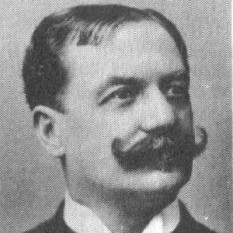Eduard Strauss (15 March 1835 – 28 December 1916) was an Austrian composer who, together with brothers Johann Strauss II and Josef Strauss formed the Strauss musical dynasty. The family dominated the Viennese light music world for decades, creating many waltzes and polkas for Austrian emperors and their courtiers. He was affectionately known in his family as 'Edi'.
Strauss' style was individual and did not attempt to emulate the works of his other brothers or his contemporaries. But he was generally recognised as a dance music conductor rather than as a composer in the Strauss family, and his popularity was always overshadowed by that of his elder brothers. Realising this, he stamped his own mark with the quick polka, known in German as the "polka-schnell". Among the more popular polkas that he ever penned for the Strauss Orchestra, which he continued to conduct until its disbandment on 13 February 1901, were "Bahn Frei" op. 45, "Ausser Rand und Band" op.168, and "Ohne Bremse" op. 238. He also found time to pen a few lovely waltzes, of which only a handful survived obscurity. The most famous is probably the "Doctrinen" op.79.
Strauss' musical career was pervaded with rivalry not only from his brothers but also from the military bandmaster and dance music composer, Karl Michael Ziehrer who even formed a rival orchestra called "Formerly Eduard Strauss Orchestra" and began giving concerts in Vienna under this new title. Eduard Strauss successfully filed a court action against Ziehrer for the improper and misleading use of his name but Ziehrer would eventually surpass the Strauss family in popularity in Vienna, particularly after the deaths of his more talented brothers, Johann Strauss II and Josef Strauss. The rivalry was to extend until the Strauss Orchestra was disbanded.
Strauss married Maria Klenkhart on 8 January 1863 and had two sons, Johann Strauss III and Josef Eduard Strauss. The eldest son, Johann Strauss III was to lead the Strauss revival well into the 20th century.
However, personal setbacks in the 1890s such as the death of brother Johann Strauss II in 1899 and his realization that his immediate family had squandered his personal fortune led Eduard Strauss to decide on retirement. In 1901, he disbanded the Strauss Orchestra and returned to Vienna where he died in 1916. He retired from public life and never actively took part in any public musical activity although he did document his family memoirs titled Erinnerungen in 1906.
Retrieved from "http://en.wikipedia.org/wiki/Eduard_Strauss"
.
Anda dapat menemukan informasi melalui mesin pencari musik terbaik - Muzlan.top 😊Semua materi berdasarkan permintaan "Eduard Strauss" tersedia di halaman Eduard Strauss
Ya tentu saja. Anda dapat mendengarkan lagu di halaman Eduard Strauss
Ya tentu saja. Anda dapat mengunduh trek di halaman Eduard Strauss
Halaman ini ditemukan oleh query: Eduard Strauss all mp3, Eduard Strauss mp3 download, Eduard Strauss flac, Eduard Strauss songs download, Eduard Strauss song download

